python编译C扩展报错
Posted
tags:
篇首语:本文由小常识网(cha138.com)小编为大家整理,主要介绍了python编译C扩展报错相关的知识,希望对你有一定的参考价值。
C:\Users\Administrator>python F:\python\extending_python-master\setup.py build
running build
running build_ext
building 'pokemon_lookup' extension
C:\Program Files (x86)\Microsoft Visual Studio\2017\Community\VC\Tools\MSVC\14.16.27023\bin\HostX86\x64\cl.exe /c /nologo /Ox /W3 /GL /DNDEBUG /MD -ID:\Users\Administrator
extend.c
C:\Program Files (x86)\Microsoft Visual Studio\2017\Community\VC\Tools\MSVC\14.16.27023\bin\HostX86\x64\link.exe /nologo /INCREMENTAL:NO /LTCG /DLL /MANIFEST:EMBED,ID=2 /M
LINK : warning LNK4044: 无法识别的选项“/python\/extending_python-master\/extend.obj”;已忽略
LINK : warning LNK4001: 未指定对象文件;已使用库
LINK : warning LNK4068: 未指定 /MACHINE;默认设置为 X86
正在创建库 /python\/extending_python-master\pokemon_lookup.cp37-win_amd64.lib 和对象 /python\/extending_python-master\pokemon_lookup.cp37-win_amd64.exp
LINK : error LNK2001: 无法解析的外部符号 __DllMainCRTStartup@12
pokemon_lookup.cp37-win_amd64.exp : error LNK2001: 无法解析的外部符号 _PyInit_pokemon_lookup
build\lib.win-amd64-3.7\pokemon_lookup.cp37-win_amd64.pyd : fatal error LNK1120: 2 个无法解析的外部命令
error: command 'C:\\Program Files (x86)\\Microsoft Visual Studio\\2017\\Community\\VC\\Tools\\MSVC\\14.16.27023\\bin\\HostX86\\x64\\link.exe' failed with exit status 1120
关键是你现在是用C,那所有内存分配的地方都有可能泄露呗。 实在不行可以Jython,或者上面提到的Cython追问
error: command
'C:\\Program Files (x86)\\Microsoft Visual
Studio\\2017\\Community\\VC\\Tools\\MSVC\\14.16.27023\\bin\\HostX86\\x64\\link.exe'
failed with exit status 1120
我想问问这个怎么解决呢
Visual Studio 2013 编译 64 位 Python 的 C 扩展 (使用 PyObject 包装)
对于 32 位 Python 的 C 扩展,以前用过 mingW32 编译,

但是 mingW32 不支持 64 位 Python 的 C 扩展编译,详情可见 stackoverflow,这位前辈的大意如下,

以下介绍 Visual Studio 2013 编译 64 位 Python 的 C 扩展步骤:
1)准备 C 文件和包装文件,
ExtDemo.c
// Purpose: C code, for wrappered. #include <stdio.h> #include <stdlib.h> #include <string.h> int fact(int n) { if(n < 2) return 1; return n * fact(n - 1); } char * reverse(char * s) { char t; char *p = s; char *q = (s + (strlen(s) - 1)); while(p < q) { t = *p; *p++ = *q; *q-- = t; } return s; } // just for unit test, for the two function above int unit_test(void) { // test fact() printf("4! = %d\\n", fact(4)); printf("8! = %d\\n", fact(8)); printf("12! = %d\\n", fact(12)); // test reverse char s[10] = "abcdef"; printf("reversing \'abcdef\', we get \'%s\'\\n", reverse(s)); char s2[10] = "madam"; printf("reversing \'madam\', we get \'%s\'\\n", reverse(s2)); return 0; }
包装代码 ExtDemo_Wrapper.c
// Purpose: According to the C code, write the Wrapper. #include "Python.h" // function declaration int fact(int n); char * reverse(char * s); int unit_test(void); static PyObject * ED_fact(PyObject * self, PyObject * args) { int num; if(!PyArg_ParseTuple(args, "i", &num)) return NULL; return (PyObject *)Py_BuildValue("i", fact(num)); } static PyObject * ED_reverse(PyObject * self, PyObject * args) { char * orig_str; if (!PyArg_ParseTuple(args, "s", &orig_str)) return NULL; return (PyObject *)Py_BuildValue("s", reverse(orig_str)); } static PyObject * ED_unit_test(PyObject * self, PyObject * args) { unit_test(); return (PyObject *)Py_BuildValue(""); } ////////////////////////////////////////////////////////////////////////////// static PyMethodDef EDMethods[] = { {"fact", ED_fact, METH_VARARGS, "fact( m )"}, // NOTE, the last string is doc-string of this function {"reverse", ED_reverse, METH_VARARGS, "reverse( str )"}, {"unit_test", ED_unit_test, METH_VARARGS, "unit_test()"}, {NULL, NULL}, }; ////////////////////////////////////////////////////////////////////////////// void initED() { Py_InitModule("ED", EDMethods); }
setup.py
#!/usr/bin/env python from distutils.core import setup, Extension MOD = \'ED\' setup(name=MOD, ext_modules=[ Extension(MOD, sources=[\'ExtDemo.c\', "ExtDemo_Wrapper.c"])])
2) Visual Studio 2013 工具准备及编译
开始菜单打开 Visual Studio Tools 文件夹,
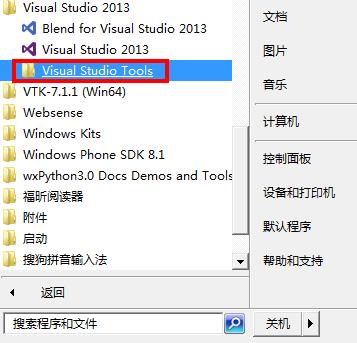
选择 64bit Native Tools,双击打开,
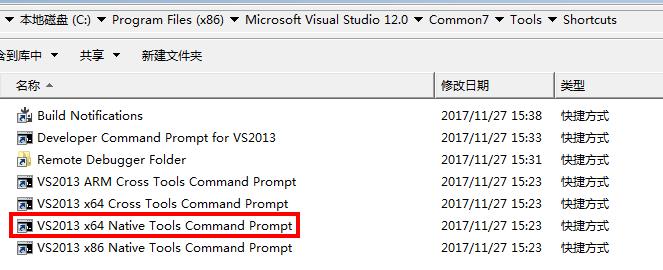
设置编译环境,如下, 关于这两个参数的含义请参考 distutils.core 官方 help 文档,
set DISTUTILS_USE_SDK=1
set MSSdk=1

切换到工程目录,编译,
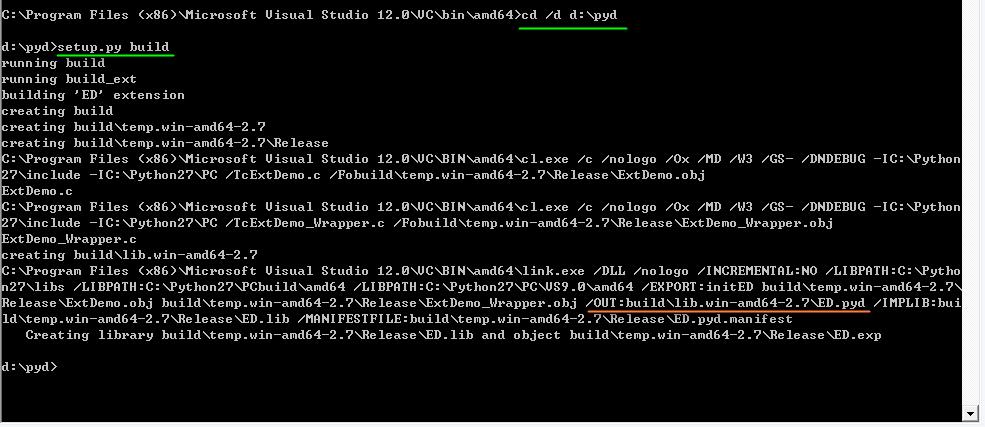
编译完成后,在工程目录下生成 build 文件夹,
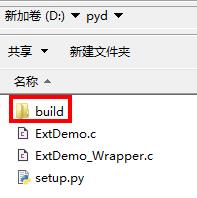
在其中 \\build\\lib.win-amd64-2.7 下得到编译生成的 pyd 文件,本例为 ED.pyd
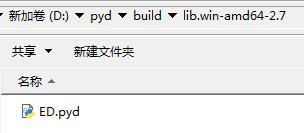
3) 验证
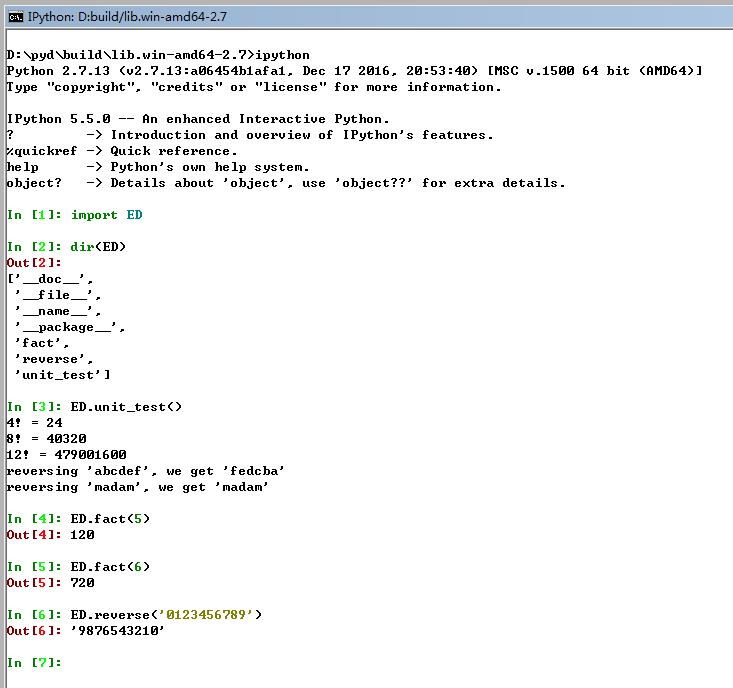
完。
以上是关于python编译C扩展报错的主要内容,如果未能解决你的问题,请参考以下文章